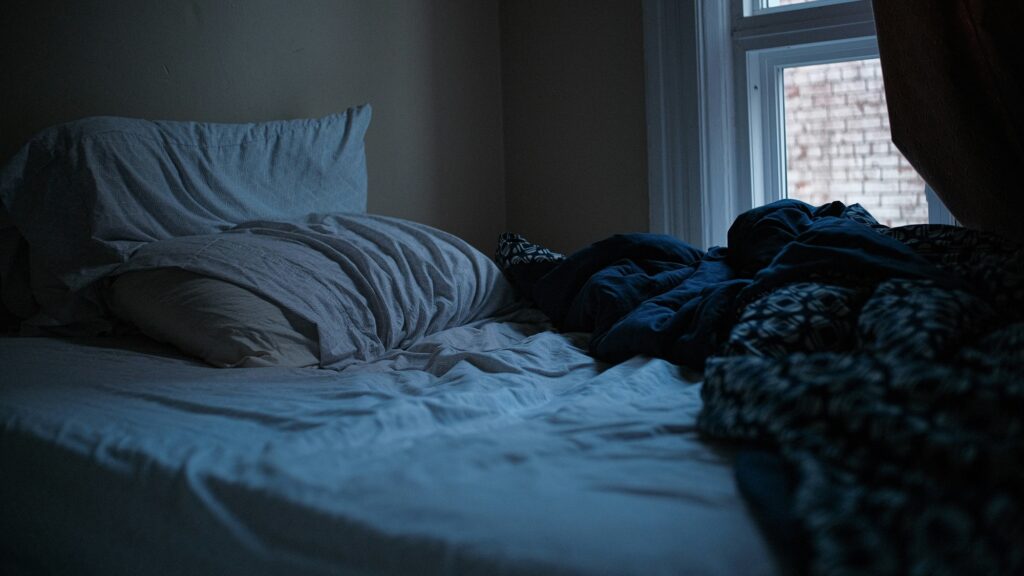We have all been there; trying hard to lose those extra pounds, and the scale just won’t budge, leaving us confused, frustrated and modifying our diet and workout plans with no results in sight. If you’re way too familiar with this, it may be time to take a look at your sleeping habits.
A lot of us deprioritize sleep at a snap of our fingers, naturally, it feels easy to do that since we seem to have more control over it because studies have shown that we are a society that is characterised by a lack of sleep for 30% of adults have reported that they get less than 6 hours of sleep every night. But sleep affects us in more ways than just feeling tired the next day, regulation of our sleep patterns can have a positive or negative impact on our weight, and vice versa, depending on the sleep routine undertaken.
Sleep and weight are closely interrelated, with numerous studies proving the correlation. Sleep patterns are generally associated with weight loss or gain, especially sleep deprivation and its association with obesity. Additionally, our bodyweight also has an impact on our quality of sleep, or the lack thereof. Therefore, regulating our sleep patterns can have a positive or negative impact on our weight, and vice versa, depending on the sleep routine undertaken. Let’s take a closer look at the relationship between sleep and weight loss.

Four things happens in your body while you are sleep deprived
1. Lack of sleep slows down your metabolic level
Metabolism is characterised as the entire scope of biochemical cycles that happen inside a living creature. It establishes the two cycles of anabolism (build-up) and catabolism (breakdown). In easier terms, Metabolism is the measure of energy (calories) the body consumes to look after itself. Metabolism overall is related to cell injury and its subsequent repair, replacement and reproduction. When you deprive yourself of enough sleep, your metabolic system is pushed out of balance, which affects your dietary choices. Which you’ll be reaching out for more carb-heavy – sugary meals instinctively and there are two essential hormones, Leptin and Ghrelin, that control this move.
Leptin and Ghrelin are extremely crucial hormones in appetite control. While Leptin (The good guy) is released by adipose tissue, it is a hormone that inhibits or discourages appetite and increases energy expenditure. On the other hand, Ghrelin (The bad guy) is a hormone that increases appetite and reduces energy expenditure. When you deprive your body of 8-hours of sleep, research has shown that it causes a 19% decrease in leptin levels, whereas Ghrelin levels increased by 28%. That means you have lesser good guys fighting those nasty snack temptations pushed forward by more bad guys. Our metabolism then craves food for psychological needs rather than the caloric need of our body.
2. Insulin resistance: A common side effect of sleep deprivation
A study by Cedars-Sinai Medical Center shows that a single night of sleep deprivation can cause as much insulin resistance as being on a high-fat diet for six months. Leaving you feeling tired and hungry more often than you should, which makes you reach out for more food, resulting in a calorie surplus.
A study conducted by the University of Chicago Medical Centre tracked 11 healthy, male adults for 16 nights, regulating their sleep patterns. On the first 3 nights, the men slept for the normal 8 hours. The next 6 nights, they slept for 4 hours and the last 7 nights, they spent 12 hours in bed. Their diets were also similar. The study from this experiment clearly showed that when tested, during sleep deprivation, there were changes in glucose metabolism that resembled a Type 2 diabetes patient. They also took 40% longer to regulate blood sugar levels, after a carb intensive meal. Insulin secretion also reduced by 30%. This staggering result clearly shows the adverse effects that sleep deprivation has on our metabolic processes.
Additionally, when sleep deprived, our metabolic system is out of balance, which affects our dietary choices. Sleep-deprived individuals crave more carbohydrates, which in turn, if left unchecked, leads to obesity, which is a major problem for young adults. Craving for salty foods also increased by 40%.
3. Your stress levels are through the roof!
The more sleep-deprived you are, the higher the stress hormone, cortisol levels are swirling through your body. And cortisol is known to increase your appetite for unhealthy foods and higher water retention. There’s a simple explanation for those unhealthy food cravings. With cortisol levels high, your happy hormone serotonin runs low. The brain figures the easiest way to boost those serotonin levels is through delicious, scrumptious fat-carb heavy meals that will make you feel satisfied and happy, leading to higher serotonin levels but with a worsening impact on your health.
4. The longer you are awake the more you eat
We’ve all craved those midnight snacks, and cups and cups of sugary coffees as we push ourselves to stay awake late binging on that new Netflix show. The longer you stay up, the more you are going to crave food. Most people feel hungry every 2 hours, so if you had your dinner at 9 PM, the hunger pangs are going to come knocking around 11-12 PM. A study conducted by Walker and Mathew, concerning sleep deprivation, has shown that as sleep time decreased from the 1950s to 2000s from 8.5 hours to 6 hours, there has been an increase in obesity from 10% to about 23%.

Five Effective ways to improve your quality of deep sleep
So the first and often overlooked step towards your weight management journey should be to ensure you get enough shut-eye. That means 7-8 hours of sleep. But if you have trouble falling and staying asleep, you could practice a couple of simple techniques to help you get quality sleep.
1. Have an early dinner
A late-night meal stimulates your system instead of calming it down. Your metabolism is also much slower towards the end of the day and would lead to improper digestion.
2. Cutaway from gadgets and take a warm bath
Relax yourself, and prepare for bedtime. An hour before bedtime, cut away from your infinite social scrolls and emails. Draw a bath or stand under a warm shower.
3. Lay down in bed and practice sleep meditation and relaxation techniques
Spend 10 minutes during bedtime to follow guided meditations that will help eliminate body aches and racing anxious thoughts to help you fall asleep naturally. The progressive muscle relaxation technique is one of my favourites to help with those aches.
4. Transport yourself into a dream world with bedtime stories
If you want to distract yourself from those spiralling thoughts of what’s in store tomorrow, one of the best ways to cut off is by listening to a nice bedtime story. We all loved storytime as a kid. Why stop now. Pick your favourite theme and listen to a relaxing story – it acts as an excellent bridge between reality and the dreamworld.
5. Sleep Music
If you have trouble staying asleep, try out sleep music. Create an ambience of a place you love with the help of soundscapes from every part of the world. Or pick a playlist especially designed to induce sleep using neural phase locking that puts you into a deep sleep.
Try out different methods and choose what works best for you. But sticking to a schedule is the key factor here. You need to train your brain to know it’s time for bed. Getting enough sleep could be the easiest yet impactful step that you could take towards your weight management journey.
Links
- https://www.healthline.com/nutrition/17-tips-to-sleep-better
- https://www.mayoclinic.org/healthy-lifestyle/adult-health/in-depth/sleep/art-20048379
- https://www.health.harvard.edu/sleep/8-secrets-to-a-good-nights-sleep
- https://www.verywellhealth.com/sleep-more-lose-weight-3233044
- https://www.ncbi.nlm.nih.gov/pmc/articles/PMC2929498/








